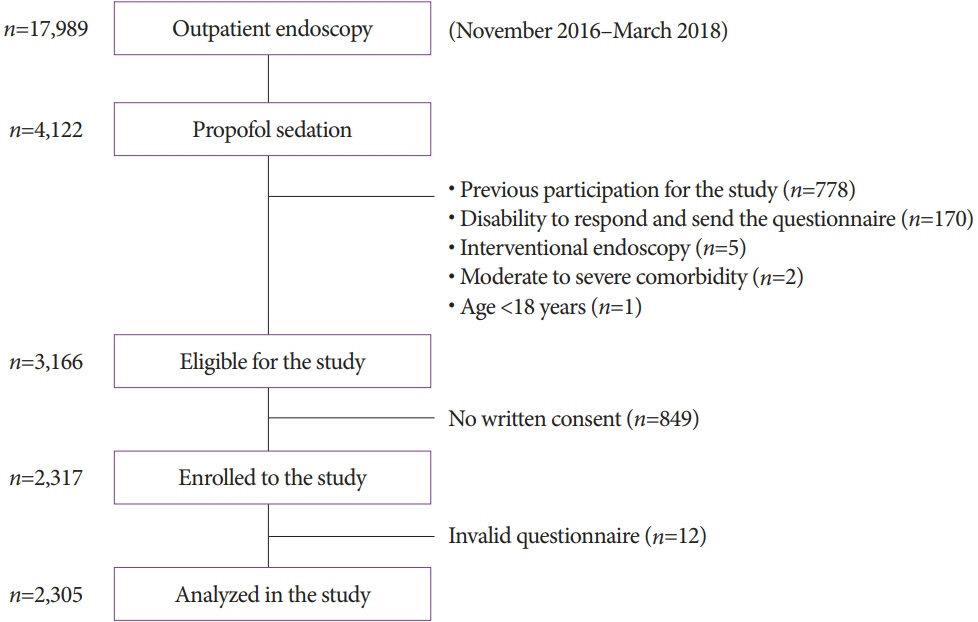Clin Endosc.
2021 May;54(3):340-347. 10.5946/ce.2020.138.
Safety and Recipient Satisfaction of Propofol Sedation in Outpatient Endoscopy: A 24-Hour Prospective Investigation Using a Questionnaire Survey
- Affiliations
-
- 1Department of Gastroenterology, Sendai City Medical Center, Sendai, Japan
- KMID: 2516313
- DOI: http://doi.org/10.5946/ce.2020.138
Abstract
- Background/Aims
The aim of this study was to evaluate the safety of sedation with propofol as an alternative to benzodiazepine drugs in outpatient endoscopy.
Methods
In this prospective study, examinees who underwent outpatient endoscopy under propofol sedation and submitted a nextday questionnaire with providing informed consent were evaluated. Periprocedural acute responses, late adverse events within 24 hours, and examinee satisfaction were evaluated.
Results
Among the 4,122 patients who received propofol in the 17,978 outpatient-based endoscopic examinations performed between November 2016 and March 2018, 2,305 eligible examinees (esophagogastroduodenoscopy for 1,340, endoscopic ultrasonography for 945, and total colonoscopy for 20) were enrolled, and their responses to a questionnaire were analyzed. The mean propofol dose was 69.6±24.4 mg (range, 20–200 mg). Diazepam, midazolam, and/or pentazocine in combination with propofol was administered to 146 examinees. Mild oxygen desaturation was observed in 59 examinees (2.6%); and mild bradycardia, in 2 (0.09%). Other severe reactions or late events did not occur. After eliminating 181 invalid responses, 97.7% (2,065/2,124) of the patients desired propofol sedation in future examinations.
Conclusions
Propofol sedation was found to be safe—without severe adverse events or accidents—for outpatient endoscopy on the basis of the patients’ next-day self-evaluation. Given the high satisfaction level, propofol sedation might be an ideal tool for painless endoscopic screening.
Keyword
Figure
Reference
-
1. Delgado AAA, de Moura DTH, Ribeiro IB, et al. Propofol vs traditional sedatives for sedation in endoscopy: a systematic review and meta-analysis. World J Gastrointest Endosc. 2019; 11:573–588.
Article2. Grant SA, Murdoch J, Millar K, Kenny GN. Blood propofol concentration and psychomotor effects on driving skills. Br J Anaesth. 2000; 85:396–400.
Article3. Riphaus A, Gstettenbauer T, Frenz MB, Wehrmann T. Quality of psychomotor recovery after propofol sedation for routine endoscopy: a randomized and controlled study. Endoscopy. 2006; 38:677–683.
Article4. Goudra B, Nuzat A, Singh PM, Borle A, Carlin A, Gouda G. Association between type of sedation and the adverse events associated with gastrointestinal endoscopy: an analysis of 5 years’ data from a tertiary center in the USA. Clin Endosc. 2017; 50:161–169.
Article5. Vaessen HH, Knape JT. Considerable variability of procedural sedation and analgesia practices for gastrointestinal endoscopic procedures in Europe. Clin Endosc. 2016; 49:47–55.
Article6. Oh JE, Lee HJ, Lee YH. Propofol versus midazolam for sedation during esophagogastroduodenoscopy in children. Clin Endosc. 2013; 46:368–372.
Article7. Horiuchi A, Nakayama Y, Fujii H, Katsuyama Y, Ohmori S, Tanaka N. Psychomotor recovery and blood propofol level in colonoscopy when using propofol sedation. Gastrointest Endosc. 2012; 75:506–512.
Article8. Horiuchi A, Nakayama Y, Hidaka N, Ichise Y, Kajiyama M, Tanaka N. Low-dose propofol sedation for diagnostic esophagogastroduodenoscopy: results in 10,662 adults. Am J Gastroenterol. 2009; 104:1650–1655.
Article9. Horiuchi A, Nakayama Y, Kajiyama M, et al. Safety and effectiveness of propofol sedation during and after outpatient colonoscopy. World J Gastroenterol. 2012; 18:3420–3425.
Article10. Sipe BW, Rex DK, Latinovich D, et al. Propofol versus midazolam/ meperidine for outpatient colonoscopy: administration by nurses supervised by endoscopists. Gastrointest Endosc. 2002; 55:815–825.11. Ulmer BJ, Hansen JJ, Overley CA, et al. Propofol versus midazolam/fentanyl for outpatient colonoscopy: administration by nurses supervised by endoscopists. Clin Gastroenterol Hepatol. 2003; 1:425–432.
Article12. Dewitt J, McGreevy K, Sherman S, Imperiale TF. Nurse-administered propofol sedation compared with midazolam and meperidine for EUS: a prospective, randomized trial. Gastrointest Endosc. 2008; 68:499–509.
Article13. Vargo JJ, Zuccaro G Jr, Dumot JA, et al. Gastroenterologist-administered propofol versus meperidine and midazolam for advanced upper endoscopy: a prospective, randomized trial. Gastroenterology. 2002; 123:8–16.
Article14. Riphaus A, Stergiou N, Wehrmann T. Sedation with propofol for routine ERCP in high-risk octogenarians: a randomized, controlled study. Am J Gastroenterol. 2005; 100:1957–1963.
Article15. Schilling D, Rosenbaum A, Schweizer S, Richter H, Rumstadt B. Sedation with propofol for interventional endoscopy by trained nurses in high-risk octogenarians: a prospective, randomized, controlled study. Endoscopy. 2009; 41:295–298.
Article
- Full Text Links
- Actions
-
Cited
- CITED
-
- Close
- Share
- Similar articles
-
- Sedation for routine gastrointestinal endoscopic procedures: a review on efficacy, safety, efficiency, cost and satisfaction
- Endoscopist-Directed Propofol: Pros and Cons
- Considerable Variability of Procedural Sedation and Analgesia Practices for Gastrointestinal Endoscopic Procedures in Europe
- The Adequate Dose of Propofol for Inducing Sedation during Performance of Upper Gastrointestinal Endoscopy in Koreans
- Pediatric Endoscopic Sedation in Korea: A Survey of the Korean Society of Pediatric Gastroenterology, Hepatology and Nutrition


